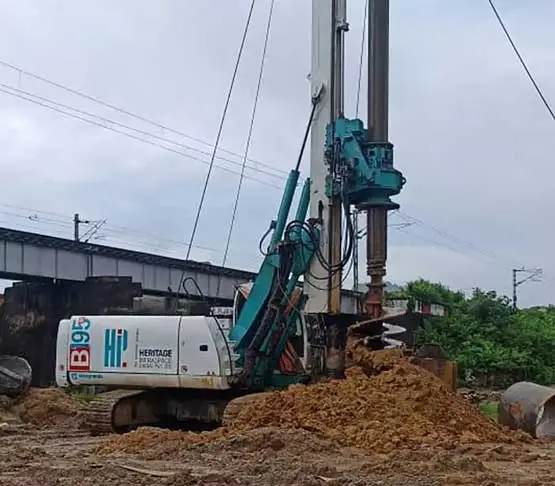
As the best ready mix concrete company in India, Heritage Infrastructure understands the importance of using high-quality concrete in construction projects. That’s why we have our own Schwing Stetter 60 cubic metre RMC plant, equipped with 12 transit mixers, 2 stationary pumps, and 1 boom placer with a boom length of 37 metres. By producing our own ready-mixed concrete, we can ensure that our projects are completed on time and within budget. Our RMC reduces shrinkage, cracking tendencies, and volume change, making it the ideal solution for construction projects with tight deadlines. As a leading RMC company in India, we’re committed to delivering the best quality products and services to our clients.
Producing high-quality ready-mix concrete involves a complex process that requires careful attention to every step. At Heritage Infraspace, we start by selecting the best raw materials available, like sand, cement, water, aggregates and admixture. Then, we mix them in a controlled environment using our state-of-the-art 60 cubic metre Schwing Stetter plant, making us one of the best ready mix concrete companies in India.
Our experienced engineers and technicians closely monitor the mixing process, ensuring that the right proportions of materials are used and that the concrete is mixed thoroughly to achieve the desired consistency and strength. This is why our customers trust us as a leading RMC company in India.
Once the concrete is produced, it undergoes rigorous testing to verify its quality and performance. We conduct multiple quality checks to ensure that our concrete meets the highest industry standards and is suitable for a wide range of construction applications, making us a reliable and trusted RMC company in India.
To ensure timely and efficient delivery of our ready-mix concrete, we use specialised supply trucks that are designed to keep the material fresh and prevent it from hardening.
Our team of skilled drivers and operators work tirelessly to ensure that the concrete is delivered to the project site on time and in the right quantity.


As the best ready mix concrete company in India, Heritage Infrastructure understands the importance of using high-quality concrete in construction projects. That’s why we have our own Schwing Stetter 60 cubic metre RMC plant, equipped with 12 transit mixers, 2 stationary pumps, and 1 boom placer with a boom length of 37 metres. By producing our own ready-mixed concrete, we can ensure that our projects are completed on time and within budget. Our RMC reduces shrinkage, cracking tendencies, and volume change, making it the ideal solution for construction projects with tight deadlines. As a leading RMC company in India, we’re committed to delivering the best quality products and services to our clients.

Piling equipment plays a crucial role in efficient and safe piling operations. Common types of equipment we use include piling rigs, vibro hammers, impact hammers and excavators/cranes. Safety measures are of utmost importance in piling operations and should be implemented by every piling company in India to mitigate risks.
Some of the key safety measures included us are proper training for operators workers and piling contractors in India we ensure the use of personal protective equipment (PPE), site preparation with clear markings and barriers, regular equipment inspections, assessing ground stability, fall protection measures, communication protocols and emergency preparedness. By following these measures, the risk of accidents and injuries can be minimised, ensuring a safe working environment.
Pile foundations offer many advantages, such as being well suited for sites with weak or compressible soils, being able to support structures in seismically active regions or areas with a high water table, being relatively easy to install and being able to support both new construction and existing structures.
Piling is used in construction to provide structural support by driving or drilling long columns, called piles, into the ground. It is necessary when the soil is weak, unstable, or prone to settlement, allowing the weight of the structure to be distributed over a larger area and reach more stable soil or rock layers.
The best soil for piling typically includes stiff clay, dense silt, or well-graded sandy soils. These soils offer good load-bearing capacity and stability, ensuring effective support for the structure. A geotechnical investigation by engineers and piling contractors is necessary to determine the most suitable soil conditions for piling.
They can be rectangular or circular in shape. Their diameter, or size, can vary from 12 to 16 inches. The length of the pile is usually 20 times the top width. They are usually designed for 15 to 20 tons.

©2024. Heritage Infraspace Pvt, Ltd.. All Rights Reserved.